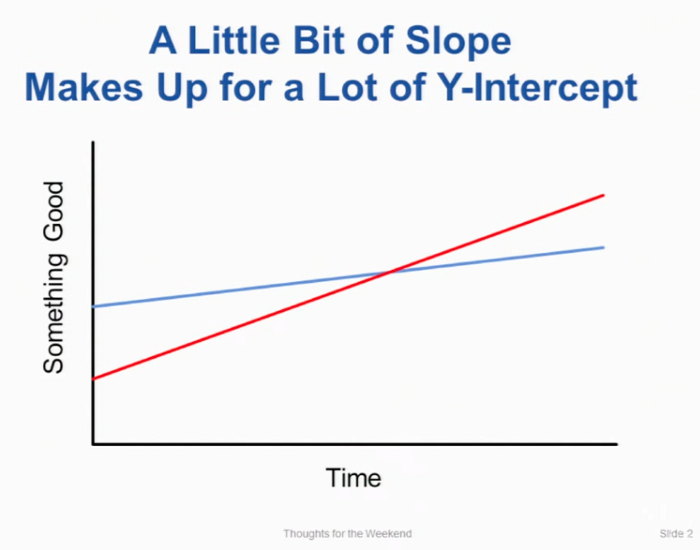A lesson on hiring people.
October 13, 2015
Recently, we hired our first two people to help us build Prezly. Two of the most important factors in deciding to hire these guys were gut feeling and team fit: a little voice in the back of our heads telling us that this could work really well.
In the case of one of these people, we didn’t really have a specific role or job description in mind. We just felt that he would be a great addition to the team, and that we would be able to figure out along the way where he was most valuable, and where his own ambitions lay.
To be honest, we didn’t really care about his studies or his experience. He came to us for a summer job, straight after he’d graduated from university. We did pick up that he was able to learn fast, to figure things out quickly. That — to my way of thinking — is one of the key factors to look out for in the first hires joining a founding team: a higher gradient makes up for a lower y-intercept (as in the red and blue lines below). In other words, how fast you learn matters more than what you know at the start.

Stanford Professor John Ousterhout explains, in one of his ‘life lessons’ (which he shares with his class in 15 minutes each Friday):
Another example is hiring. Before I came back to academia a couple of years ago I was out doing startups. What I noticed is that when people hire they are almost always hire based on experience. They’re looking for somebody’s resume trying to find the person who has already done the job they want them to do three times over. That’s basically hiring based on Y-intercept.Personally I don’t think that’s a very good way to hire. The people who are doing the same thing over and over again often get burnt out and typically the reason they’re doing the same thing over and over again is they’ve maxed out. They can’t do anything more than that. And, in fact, typically what happens when you level off is you level off slightly above your level of competence. So in fact you’re not actually doing the current job all that well.So what I would always hire on is based on aptitude, not on experience. You know, is this person ready to do the job? They may never have done it before and have no experience in this area, but are they a smart person who can figure things out? Are they a quick learner? And I’ve found that’s a much better way to get really effective people.So I think this is a really interesting concept you can apply in a lot of different ways. And the key thing here I think is that slow and steady is great. You don’t have to do anything heroic. You know the difference in slopes doesn’t have to be that great if you just every day think about learning a little bit more and getting a little bit better, lots of small steps, its amazing how quickly you can catch up and become a real expert in the field.
A lesson to remember
Don’t hire based on résumé or skills; hire on how quickly someone can pick up new stuff. Don’t test your candidates by seeing how well they know their own area. Instead, throw them something they don’t know yet and see how they handle it!